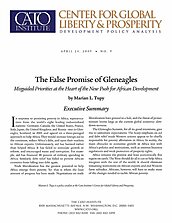Trade liberalization has the greatest potential to help Africa emerge from poverty. Yet that is where the least amount of progress has been made. Negotiations on trade liberalization have ground to a halt, and the threat of protectionism looms large as the current global economic slowdown worsens.
The Gleneagles Summit, for all its good intentions, gave rise to unrealistic expectations. The heavy emphasis on aid and debt relief made Western actions appear to be chiefly responsible for poverty alleviation in Africa. In reality, the main obstacles to economic growth in Africa rest with Africa’s policies and institutions, such as onerous business regulations and weak protection of property rights.
Africa remains the poorest and least economically free region on earth. The West should do all it can to help Africa integrate with the rest of the world. It should eliminate remaining restrictions on African exports and end Western farm subsidies. Africans, however, will have to make most of the changes needed to tackle African poverty.


